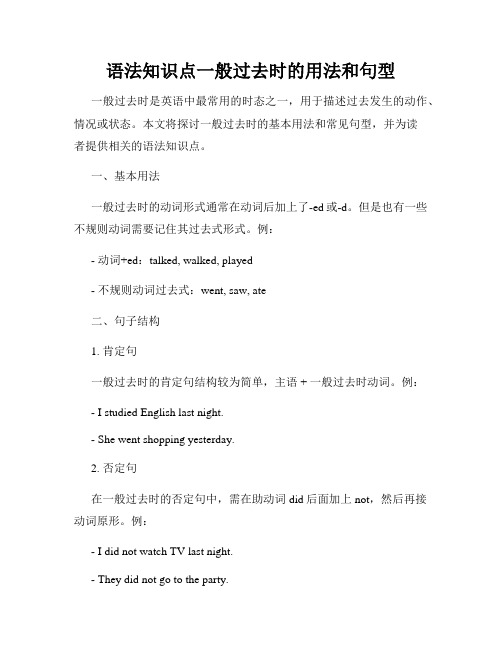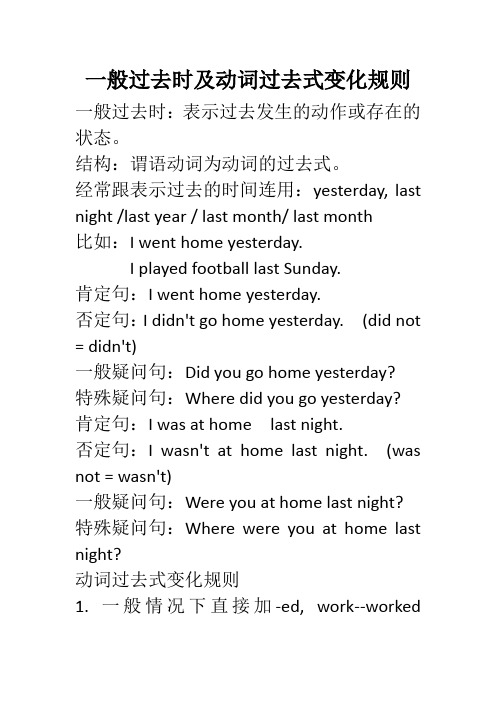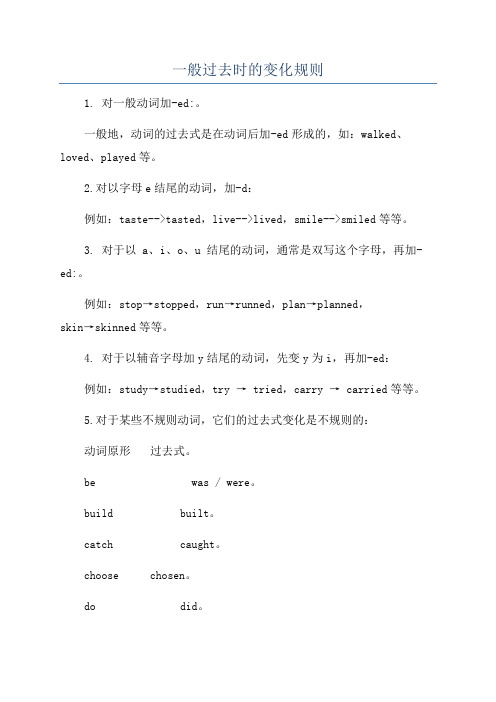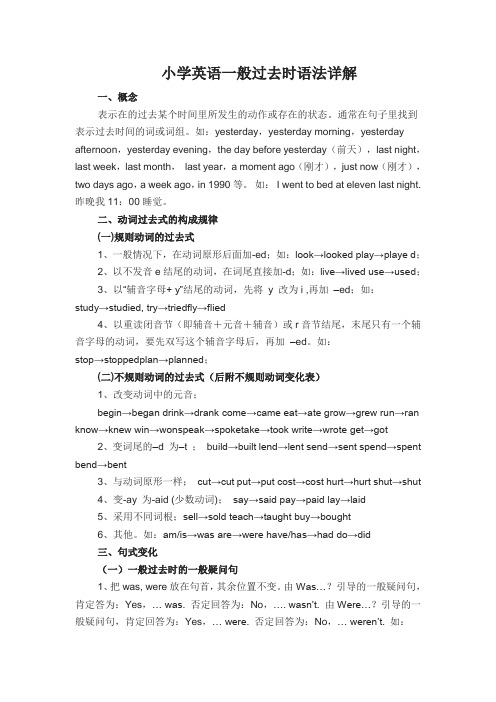一般过去式动词及句型变化规律
一般过去时的概念及用法

一般过去时的概念及用法一、基本概念一般过去时(simple past tense)表示过去某个时间里发生的非持续性动作或存在的状态,也表示经常或反复发生的动作。
用动词的过去式表示,常和表示过去的时间状语连用,如:yesterday,last night,in 1990,two days ago,before,the age of等。
一般过去时也表示过去经常或反复发生的动作,常和often,always等表示频率的时间状语连用。
表示过去习惯性、经常性的动作、行为;过去所具备的能力和性格。
二、动词变化1.直接加ed: work—— worked look——looked2.以不发音e结尾的单词,直接加d: live ——lived hope——hoped use——used 3.以+y结尾的,变y为i加ed: study—— studied carry——carried worry——worried 4.以一个辅音字母结尾的,双写最后的+ed: stop—— stopped plan——planned重读闭音节体现形式为辅-元-辅结构,例如nod, n为辅音,o为元音,d为辅音。
5. 以ic结尾的动词,要把ic变成ick再加ed,如picnic→picnicked,traffic→trafficked 6.不规则变化的动词:have---had are---were get---got say---said feel---felt do/does---did is---was go---went drink--drank eat--ate bring----brought think----thought buy----bought catch---- caught teach ---- taught sit----sat wear----wore cut----cut sweep----swept sleep——slept see----saw bee----became read——read7.以辅元辅结尾的加d三、用法(1)一般过去时表示在某个特定时间发生,也可以表示过去习惯性、经常性的动作。
一般过去时专项练习及动词过去式变化规则

一般过去时专项练习及动词过去式变化规则动词过去式变化规则一、规则变化1、一般情况下,动词词尾加-ed,,如:work—worked play—played want—wanted ask—asked2、以不发音的-e结尾动词,动词词尾加-d,如:live—lived move—moved taste—tasted3、以“辅音字母+y”结尾的动词,把y改成I,加—ed, 如:study—studies try—tried copy—copied carry—carried4、重读闭音节动词,以“辅元辅”结尾,双写词尾辅音字母,再加—ed, 如:stop—stopped二、不规则变化Is /am—was are—were do—did have/ has—had go—went meet—met come—came take—took steal—stole eat—ate fly—flew run—ran see—saw say—said make—made find—found stand—stood sit—sat sing—sang drink—drank give—gave ring—rang swim—swam write—wrote ride—rode drive—drove draw—drew grow—grew know—knew get—got forget—forgot sweep—swept keep—kept sleep—slept speak—spoke break—broke tell—told sell—sold buy—bought think—thought catch—caught teach—taught build—built can—could shall—should will—would过去式与动词原形一样:let—let must—must put—put read—read三、动词过去式构成读音1、清辅音后读清辅音[t] (清读清)如:jump like2、浊辅音后读浊辅音[d] (浊读浊)如:listen pull3、元音后面读浊辅音[d] (元音后面读浊音)如:water play4、[t][d]后面读[id] want need一般过去时专项练习一、写出下列动词的过去式1.am/is ______2.do _______3.go ________4.have _______5.isn’t _________6. ar en’t ________7.spend________8.cook_______9.read________10.clean_______ 11.live _______ 12.study_________三、用括号内所给词的适当形式填空1. We _________ (enjoy) ourselves at the party last night.2.Jack ____________ (study) for the English test last Sunday.3._______ you ______ (go) to the Great Wall last year?4. What day _______ (be) it yesterday?5.The old man _______(be)ill and went to see a doctor.6.We ________ (have) a party last night.7.We __________ (visit) the museum and went home.8.— How _______ (be) the students? — They were very friendly.9.He often _______ (have) supper at home. Today he ______ (have) supper at school.10.— ______ he _______ (have) lunch at nine? —No, he didn’t.11.They _________(buy) a guitar yesterday.五、选择填空( ) 1. Lee ____ his mobile phone at home. A. leave B. leaves C. leaved D. left( ) 2. ___ he ___a good rest? No, he didn’t. A. Do, had B. Did, have C. Did, had D. Was, had ( ) 3. As soon as he __, he _ to his family.A. arrived, writesB. arrived, writtenC. arrived, wroteD. arriveds, write( ) 4. Mr. Black was late because he _______ his way. A. losted B. lose C. loses D. lost ( ) 5. When _________ Lee ________ school this morning?A. did, got toB. did, get toC. did, getD. did, got( ) 6. Will you please say it again? I _ quite __you.A. didn’t, hearB. don’t, heardC. didn’t, heardD. don’t, hear( ) 7. _you __at six o’clock yesterday? A. Do ,ge t up B. Did, get up C. Do, got up D. Did, got up ( ) 8.What did you see ____? A. now B. every day C. these days D. just now( ) 9.He went into the room and ____ the door. A. lock B. locking C. locks D. locked ( ) 10. What __ you __last week? I bought a bag.A. did ,buy B. did , bought C. do, buy D. do, bought ( ) 11. —__he __his lunch? — Yes, he did. A. Does ,has B. Does, have C. Did, have D. Did, had ( )12.—Did the thieves _____ into the car? —No, they______.A. fell, didn’tB. fall(落下), didC. jump(跳), didn’tD. jump, did( ) 13. -When did May come back from Hong Kong? -She __ from Hong Kong last Friday.A. come backB. comes backC. returned backD. came back( ) 14. ____ she _____ this dictionary in the bookshop nearby last week?A. Did, buyB. Does, buyC. Did, boughtD. Does, buys( ) 15. He ____ to the station this morning and was______ for the train.A. hurry, in timeB. hurries, on timeC. hurried, in timeD. hurried, at time( ) 16. Where _____ Uncle Sun yesterday? A. was B. were C. did D. does( ) 17. —Have you seen him today? —Yes, I ____ him this morning.A. seeingB. seeC. seesD. saw( ) 18. He ____worried when he heard the news. A. is B. was C. does D. did( ) 19. There ___ a telephone call for my brother Steven yesterday? A. is B. are C. was D. were ( ) 20. Liu Fengwei _____ three yuan for the lost library book.A. paidB. payC. spentD. lost( ) 21. He __ in this school in 1958. A. taught B. teach C. teaches D. teaching( ) 22. They __ tired so they stopped __a rest.A. are, haveB. were, haveC. were, to haveD. are, having( ) 23. Yesterday I _____ in bed all day because I had a fever. A. lay B. lie C. laid D. lied ( ) 24. It was raining hard when he ____ home. A. got B. get C. gets D. was getting( ) 25. She said her brother ____ in Beijing. He ______ to Japan on business last week.A. wasn’t, wentB. hasn’t, wentC. wasn’t, goD. isn’t, went七、用所给动词的适当形式填空1.Tom and Mary ___________ (come) to China last month.2.Mary __________ (read) English yesterday morning.3.There _________ (be) no one here a moment ago.4.I ___________ (call) Mike this morning.5.I listened but ___________ (hear) nothing.6.Tom ___________ (begin) to learn Chinese last year.st week we _________ (pick) many apples on the farm.8.My mother ________________ (not do) housework yesterday.9.She watches TV every evening. But she _______________ (not watch) TV last night.10.________ your father ________ ( go ) to work every day last year?st year the teacher ___________ (tell) us that the earth moves around the sun.12.There ____________ a telephone call for you just now. (be)13.There __________ not enough people to pick apples that day. ( be)14.There _____________ any hospitals (医院) in my hometown (家乡) in 1940. ( be not)15.There ____________ enough milk at home last week, wasn’t there?16.Eli ____________ to Japan last week. ( move)17. –When _______ you _________ (come) to China? - Last year.18.Did she ________ (have) supper at home?19.Jack ____________ (not clean) the room just now.20._________ (be) it cold in your city yesterday?21.How many people ________ (be) there in your class last term?22.It ________ (be) hot yesterday and most children _______ (be) outside.23. There ________ (be) a football match on TV yesterday evening, but I _________ (have) no time to watch it.24. He ate some bread and _________ (drink) some milk.25. ________ he __________ (finish) his homework last night?26. I__________(be) tired yesterday.27. What _________ you ___________ (do) last night?28. My grandfather _________ (leave) Hong Kong for New York in 1998.29. What _______ he ________ (do) yesterday?30. Last week I _______ (buy) a new bike.31. He ________ (be) here just now.32. He __________ (not find ) his key last night.33. My father __________ (drink) a lot of wine yesterday.。
四种时态的句型结构及变化规则

四种时态的句型结构及变化规则一、一般现在时1. 句型结构:主语 + 现在时态动词 + 其他成分2. 变化规则:谓语动词根据主语的人称和数的变化而变化,其中第三人称单数一般在动词原形后面加-s或-es。
3. 例如:- I play basketball every day.- She works in apany.二、一般过去时1. 句型结构:主语 + 过去时态动词 + 其他成分2. 变化规则:一般情况下,谓语动词在原形后面加-ed,但也有部分不规则动词变化。
3. 例如:- We went to the park yesterday.- He studied English last night.三、一般将来时1. 句型结构:主语 + 将来时态助动词 + 动词原形 + 其他成分2. 变化规则:将来时态助动词包括will和shall,后面跟动词原形,表示将来发生的动作或状态。
3. 例如:- They will go to Beijing next month.- She shall finish the work tomorrow.四、现在进行时1. 句型结构:主语 + be动词 + 现在分词 + 其他成分2. 变化规则:be动词根据主语的人称和数的变化而变化,现在分词通常以-ing结尾。
3. 例如:- I am reading a book now.- They are playing football in the park.总结:四种时态的句型结构及变化规则在英语语法中起着非常重要的作用,掌握好这些规则对于正确的运用时态是至关重要的。
通过不断的练习和积累,相信大家都可以掌握好这些时态的用法。
一、一般现在时一般现在时是英语中最基本的时态之一,表示经常性、习惯性或普遍性的动作或状态。
在句子中的位置通常是主语 + 现在时态动词 + 其他成分。
动词的变化规则是谓语动词根据主语的人称和数的变化而变化,其中第三人称单数一般在动词原形后面加-s或-es。
语法知识点一般过去时的用法和句型

语法知识点一般过去时的用法和句型一般过去时是英语中最常用的时态之一,用于描述过去发生的动作、情况或状态。
本文将探讨一般过去时的基本用法和常见句型,并为读者提供相关的语法知识点。
一、基本用法一般过去时的动词形式通常在动词后加上了-ed或-d。
但是也有一些不规则动词需要记住其过去式形式。
例:- 动词+ed:talked, walked, played- 不规则动词过去式:went, saw, ate二、句子结构1. 肯定句一般过去时的肯定句结构较为简单,主语 + 一般过去时动词。
例:- I studied English last night.- She went shopping yesterday.2. 否定句在一般过去时的否定句中,需在助动词did后面加上not,然后再接动词原形。
例:- I did not watch TV last night.- They did not go to the party.3. 一般疑问句一般过去时的一般疑问句需要将助动词did放在句首,然后将主语放在did后面,接原形动词。
例:- Did you finish your homework yesterday?- Did they visit their grandparents last weekend?三、时间状语一般过去时常与表示过去时间的状语连用,以明确动作或状态发生的时间。
以下是一些常用的时间状语:- yesterday- last week/month/year- in 1990- a few days ago- when I was a child- at that time- in the past四、陈述句和疑问句的回答在陈述句中,我们通常用完整的句子回答,而在疑问句中,我们可以用简略回答或完整回答。
例:- Did you go to the party? - Yes, I did. / No, I didn't.- Did he finish his homework? - Yes, he did. / No, he didn't.五、经常与一般过去时连用的词汇1. 过去连续性的动作:- was/were + 动词-ing:I was playing basketball when she called me. - used to + 动词原形:I used to walk to school when I was young.2. 时间副词:- ago:He moved to New York two years ago.- before:I had never seen such a beautiful scenery before.- when:I was reading a book when the phone rang.3. 愿望:- wish + 一般过去时:I wish I knew the answer.六、一般过去时的注意事项1. 与现在的区别:一般过去时描述过去的动作、情况或状态,与现在时相对应。
一般过去时的句子结构

一般过去时的句子结构1、be动词的一般过去时其句型:肯定式:主语+BE动词过去式(was、were)+其他 e.g.I was very happy last night.否定式:主语+BE动词过去式(was、were)+not+其他 e.g.Mike wasn’t at home yesterday. 疑问式:BE动词过去式(was、were)+主语+其他 e.g.Was he a driver three years ago?2、当谓语由实义动词充当(不区分第三人称单数):肯定式:主语+动词过去式+其它 e.g.I played the piano yesterday evening.否定式为:主语+did not+动词原形+其它 e.g.He didn’t go to the cinema last night.疑问式为:Did+主语+动词原形+其它 e.g.Did she teach you English yesterday?一般过去时的句子结构1、be动词的一般过去时其句型:肯定式:主语+BE动词过去式(was、were)+其他 e.g.I was very happy last night.否定式:主语+BE动词过去式(was、were)+not+其他 e.g.Mike wasn’t at home yesterday. 疑问式:BE动词过去式(was、were)+主语+其他 e.g.Was he a driver three years ago?2、当谓语由实义动词充当(不区分第三人称单数):肯定式:主语+动词过去式+其它 e.g.I played the piano yesterday evening.否定式为:主语+did not+动词原形+其它 e.g.He didn’t go to the cinema last night.疑问式为:Did+主语+动词原形+其它 e.g.Did she teach you English yesterday?一般过去时的句子结构1、be动词的一般过去时其句型:肯定式:主语+BE动词过去式(was、were)+其他 e.g.I was very happy last night.否定式:主语+BE动词过去式(was、were)+not+其他 e.g.Mike wasn’t at home yesterday. 疑问式:BE动词过去式(was、were)+主语+其他 e.g.Was he a driver three years ago?2、当谓语由实义动词充当(不区分第三人称单数):肯定式:主语+动词过去式+其它 e.g.I played the piano yesterday evening.否定式为:主语+did not+动词原形+其它 e.g.He didn’t go to the cinema last night.疑问式为:Did+主语+动词原形+其它 e.g.Did she teach you English yesterday?。
小学一般过去时及动词过去式变化规则及不规则形式

一般过去时及动词过去式变化规则一般过去时:表示过去发生的动作或存在的状态。
结构:谓语动词为动词的过去式。
经常跟表示过去的时间连用:yesterday, last night /last year / last month/ last month比如:I went home yesterday.I played football last Sunday.肯定句:I went home yesterday.否定句:I didn't go home yesterday. (did not = didn't)一般疑问句:Did you go home yesterday?特殊疑问句:Where did you go yesterday?肯定句:I was at home last night.否定句:I wasn't at home last night. (was not = wasn't)一般疑问句:Were you at home last night?特殊疑问句:Where were you at home last night?动词过去式变化规则1. 一般情况下直接加-ed, work--workedwalk-- walked help--helped play--played2. 以不发音的字母e结尾的动词,加d, dance--danced like-liked3. 以重读闭音节结尾,而且结尾只有一个辅音字母,双写这个辅音字母,再加ed, plan--planned, stop--stopped, shop--shopped4. 以辅音字母加y结尾的动词,把y变成i,再加ed, try-- tried, study--studied5. 不规则动词的变化:take--took, have--had, see--saw, draw--drew, come--came, give--gave, sit--sat, sing--sang, swim--swam, drink--drank, run--ran, put --put read--read, buy--bought, am/is--was are--were , do --did, go --went, make---made。
一般过去时及动词的过去式变化规则

一般过去时及动词的过去式变化规则一般过去时1)、表示过去发生的动作或出现的状态,用动词的过去式来表达,如:I was at the library yesterday afternoon.Tom studied hard and did well in the final exam last year.2)、动词的过去式分为规则动词和不规则动词两种:规则动词的过去式:①一般情况下在动词原形后直接加-ed。
wanted,played②以不发音的字母e结尾的动词,直接加-d。
hoped,lived③重读闭音节单词如果末尾只有一个辅音字母需双写最后一个辅音字母,再加-ed stopped④以辅音字母+y结尾的动词变y为i,再加-ed。
studied,worried以元音字母+y结尾的动词,直接加-ed. played, enjoyed规则动词过去式的读音也有规律可循。
请记住:清后[t],元浊[d],[t] [d]之后读[id]。
①清辅音后,ed要读[t]。
worked,finished②元音或浊辅音后,ed要读[d]。
lived,called③[t]或[d]后,ed读[id]。
started,needed不规则动词有其自己的变化形式,只能分别记忆。
1. go -went2.take-took3. have-had4.buy-bought5. eat-ate6.see-saw7. hang-hung(悬挂)8.meet-met9. win-won(赢得) 10.sleep-slept 11. put-put e-came13. wake-woke(醒)14.read-read 15let-let (详见课本《不规则动词表》)3)句式及其变化:a. be动词过去式的句式:否定句是在was/were后面加not,was not (wasn't)/were not (weren't)。
一般疑问句是把was / were提前并放到句首,要求首字母要大写b. 实义动词过去式的句式:①肯定式:主语+动词过去式+其它。
一般过去时动词变化规则

一般过去时动词变化规则一般过去时是英语中最常用的时态之一,用来表示过去发生的动作或状态。
在使用一般过去时时,动词的变化规则是非常重要的。
下面将介绍一般过去时动词的变化规则及其用法。
一般过去时的动词变化规则:1. 对于大多数动词,一般过去时的构成是在动词原形的基础上加上-ed结尾。
例如:work → worked,play → played,study→ studied等。
2. 对于以不发音的-e结尾的动词,只需要加上-d结尾。
例如:live → lived,love → loved,hate → hated等。
3. 对于以辅音字母+y结尾的动词,变化时将y变为i,再加上-ed结尾。
例如:carry → carried,study → studied,try → tried等。
4. 对于以重读闭音节结尾的单词,要双写最后一个辅音字母,再加上-ed结尾。
例如:stop → stopped,plan → planned,refer → referr ed等。
5. 不规则动词的过去式需要通过记忆来掌握,例如:go → went,eat → ate,drink → drank等。
一般过去时的用法:1. 表示过去的动作或状态。
例如:She worked in a bank last year.(她去年在一家银行工作。
)2. 表示过去的习惯性动作。
例如:He always played football after school.(他放学后总是踢足球。
)3. 表示过去的真实条件。
例如:If I had time, I would go with you.(如果我有时间,我会和你一起去。
)总结:一般过去时的动词变化规则是非常重要的,掌握好这些规则可以帮助我们正确地使用一般过去时。
除了掌握动词的变化规则外,我们还需要注意一般过去时的用法,这样才能在实际运用中做到恰如其分。
希望通过本文的介绍,读者们能够更好地掌握一般过去时的动词变化规则及其用法。
一般过去时的规则和不规则变化

如:
study —— studied cry —— cried
பைடு நூலகம்
carry —— carried
worry —— worried
4.重读闭音节结尾的动词末尾只有一个 辅音字母,需双写这个辅音再加-ed.
stop ___ stopped shop ___ stopped
规则动词过去式记忆口诀
过去式构成有规律 一般词尾加-ed 如词尾有个e,直接加-d就可 辅音字母y结尾,变y为i加-ed 辅音重闭结尾,双写之后加-ed
不规则动词的过去式
(1)动词原形和过去式一样 let——let read——read cost——cost put——put cut——cut hurt——hurt
(2)遇见i改为a swam sang began sat gave drank
swim sing begin sit give drink
(3)过去式以ought和aught结尾的单词 brought bought thought caught taught
bring buy think catch teach
一般过去时的规则动词和不规则动词
旅10
规则动词
1.一般的动词:直接加-ed
如:watch——watched help——helped work——worked
2.以字母e结尾的单词:加-d
如:love——loved live——lived arrive——arrived
3.以辅音字母y结尾的动词:变y为i再加-ed
(4)中间去e末尾加t
feel keep sleep
一般过去时的规则与常见句型解析

一般过去时的规则与常见句型解析一般过去时是英语中最常用的过去时态之一,用来表达在过去某个具体时间或一段时间内发生的动作或存在的状态。
本文将解析一般过去时的规则和常见句型,帮助读者正确运用该时态。
一、一般过去时的规则1. 动词规则变化:一般过去时的动词大部分采用动词过去式的形式,一般是在动词原形后加上-ed。
例如:work → worked, visit → visited.还有一些特殊情况,如:a. 以辅音字母+y结尾的动词,变为过去式时,将y变为i再加-ed。
例如:study → studied.b. 以“辅音字母+元音字母+辅音字母”结尾的重读闭音节动词,且末尾只有一个辅音字母时,先双写该辅音字母,再加-ed。
例如:stop→ stopped.c. 以“-e”结尾的动词,在结尾加上-d。
例如:live → lived.d. 一些不规则动词,变为过去式时需根据规则记忆。
例如:go → went, have → had.2. 句子结构:一般过去时的肯定句由主语 + 动词的过去式 + 其他成分构成。
例如:She played basketball last night.否定句由主语 + 动词的过去式 + not + 其他成分构成。
例如:He did not go to the party.疑问句由动词did + 主语 + 动词原形 + 其他成分构成。
例如:Did you finish your homework?二、一般过去时的常见句型1. 表示过去经常性的动作:常用的句型有"used to + 动词原形"和"would + 动词原形"。
例如:a. We used to go swimming every Sunday.b. He would often take a walk after dinner.2. 表示过去同时或相继发生的动作:常用的句型有"When + 一般过去时,一般过去时"和"While + 一般过去时,一般过去时"。
动词的一般过去时变化规律

一般过去式的变化规则:1、一般在动词末尾加-ed;2、结尾是e加d;3、末尾只有一个元音字母和一个辅音字母的重读闭音节,应双写末尾的辅音字母,再加-ed,;4、以“辅音字母+y”结尾的,变y为i,再加-ed;5、不规则动词过去式:am,is-was are-were do-did see-saw say-said give-gave get-got go-went come-came have-had eat-ate;3、末尾只有一个元音字母和一个辅音字母的重读闭音节,应双写末尾的辅音字母,再加-ed,;4、以“辅音字母+y”结尾的,变y为i,再加-ed;5、不规则动词过去式:am,is-was are-were do-did see-saw say-said give-gave get-got go-went come-came have-had eat-ate;扩展一般过去时表示过去某个时间里发生的动作或状态;过去习惯性、经常性的动作、行为。
在英语语法中,“时“指动作发生的时间,”态“指动作的样子和状态。
一般过去时句法结构:1、肯定形式:主语+动词过去式+其他2、否定形式主语+didn't +谓语动词原形+其他①was/were+not;②在行为动词前加didn't,同时还原行为动词3、一般疑问句①Did+主语+谓语动词原形+其它?②Was/Were+主语+表语?4、一般过去时的特殊疑问句疑问词+ did+主语+动词原形+其他?疑问词+was/were+物主代词/...'s+sth.?5、被动语态主语+ was / were + 动词的过去分词。
一般过去时的变化规则

一般过去时的变化规则1. 对一般动词加-ed:。
一般地,动词的过去式是在动词后加-ed形成的,如:walked、loved、played等。
2.对以字母e结尾的动词,加-d:例如:taste-->tasted,live-->lived,smile-->smiled等等。
3. 对于以 a、i、o、u 结尾的动词,通常是双写这个字母,再加-ed:。
例如:stop→stopped,run→runned,plan→planned,skin→skinned等等。
4. 对于以辅音字母加y结尾的动词,先变y为i,再加-ed:例如:study→studied,try → tried,carry → carried等等。
5.对于某些不规则动词,它们的过去式变化是不规则的:动词原形过去式。
be was / were。
build built。
catch caught。
choose chosen。
do did。
fall fell。
fight fought。
find found。
fly flew。
forget forgot。
get got 。
give gave。
go went。
have had。
hear heard。
know knew。
leave left。
make made。
meet met。
pay paid。
ride rode。
see saw。
say said。
send sent。
show showed。
speak spoke。
spend spent。
stand stood。
take took。
tell told。
think thought。
understand understood。
wear wore。
win won。
6.有些动词的过去式和原形相同:例如:put,cut,hit,cost,let等等。
以上是一般过去时的变化规则。
1、用于过去时的动作或状态:She walked to the store. 她走到商店了。
一般过去时动词变化规则口诀

一般过去时动词变化规则口诀
英语学习的过程中,语法是非常重要的一个部分,虽然考试的时候没有专门考语法的,但是语法却贯穿整个考试以及学习的过程。
今天我们为大家整理了英语动词过去式变化规则口诀,一起来看一下吧。
英语动词过去式变化规口诀:
1.一般动词直接加-ed,例如:look-looked;
2.以e结尾的动词直接加-d,例如:dance-danced;
3.辅音字母加y结尾的,变y为i再加ed,例如:study-studied;
4.以重读闭音节结尾,末尾只有一个辅音字母,双写这个辅音字母加-ed,例如:skip-skipped;
5.以c结尾的动词,要变c为ck,再加-ed;
6.以l结尾的动词,若以非重读音节结尾,则末尾的字母双写与不双写均可。
其中不双写的是美式拼写。
例如:
travel-travelled/traveled;
7.部分以-p结尾的动词同样遵循第5条,这类词多由“前缀+名词”构成。
一般过去时变化规则

一般过去时变化规则一般过去时是英语中最常用的时态之一,表示过去发生的动作或状态。
在构成一般过去时的句子时,动词需要进行相应的变化。
下面将介绍一般过去时的变化规则。
一般规则动词的变化在一般过去时中,一般规则动词的变化非常简单,只需在动词原形后加上-ed。
例如:- work → worked- play → played- walk → walked这些动词在一般过去时中都只需加上-ed就可以了。
但是也有一些特殊情况需要注意。
以不规则动词的变化不规则动词在一般过去时中的变化不遵循一般规则,需要进行特殊的变化。
例如:- go → went- eat → ate- see → saw这些动词在一般过去时中都有自己特定的过去式形式,需要进行记忆和熟练掌握。
动词变化的特殊情况在一般过去时中,有一些动词的变化需要注意特殊情况。
例如以不发音的-e结尾的动词,在变化时需要去掉这个-e再加上-ed。
例如:- dance → danced- love → loved还有一些以辅音字母+y结尾的动词,变化时需要将y变为i再加上-ed。
例如:- study → studied- carry → carried另外,还有一些动词在变化时需要双写末尾的辅音字母再加上-ed。
例如:- stop → stopped- plan → planned这些都是在一般过去时中需要注意的特殊情况,需要进行细致的学习和掌握。
总结一般过去时是英语中最常用的时态之一,掌握好一般过去时的变化规则对于学习英语非常重要。
一般规则动词只需在原形后加上-ed,不规则动词需要进行特殊的变化,而一些特殊情况也需要特别注意。
通过不断的练习和记忆,相信大家一定可以掌握好一般过去时的变化规则,从而在英语学习中更加游刃有余。
一般过去时的变化规则

一般过去时的变化规则过去时是英语中最基础的时态之一,在英语学习中非常重要。
过去时用于表示已经发生的动作或状态,一般情况下是在动词的后面加上“-ed”结尾。
下面我来更详细地介绍一下一般过去时的变化规则。
1. 一般规则对于动词的一般过去时,在动词的词干(即除去-ing,-ed,-s三个词尾,只留下动词原形)后加上了“-ed”这个词尾。
例如:- walk -> walked (走路 -> 走过了)- jump -> jumped (跳 -> 跳过了)- rain -> rained (下雨 -> 下了雨)注:对于以“e”结尾的动词,只需要在其后面加上“d”这个词尾即可。
- love -> loved (喜爱 -> 喜爱了)- hike -> hiked (远足 -> 远足了)对于以一个辅音字母结尾的重读闭音节的动词,需要双写辅音字母,然后再加上“-ed”这个词尾。
例如:- stop -> stopped (停止 -> 停止了)- drop -> dropped (投掷 -> 投掷了)注:有些重读音节的动词,不用双写辅音字母,因为它们以“w”、“x”、“y”结尾。
例如:- blow -> blew (吹 -> 吹了)- tax -> taxed (对...课税 -> 对...课税了)2. 不规则动词不是每个动词都遵循一般规则的变化方式。
有一些动词是不规则动词,它们在一般过去时的变化方式与规则动词不同。
例如:- go -> went (去 -> 去了)- eat -> ate (吃 -> 吃了)- sleep -> slept (睡 -> 睡了)对于不规则动词,我们需要大量的练习以便熟练记忆它们的变化方式。
3. 特殊情况在英语语言中,有一些动词在变化时需要注意一些特殊情况。
小学英语一般过去时语法详解

小学英语一般过去时语法详解一、概念表示在的过去某个时间里所发生的动作或存在的状态。
通常在句子里找到表示过去时间的词或词组。
如:yesterday,yesterday morning,yesterday afternoon,yesterday evening,the day before yesterday(前天),last night,last week,last month,last year,a moment ago(刚才),just now(刚才),two days ago,a week ago,in 1990等。
如:I went to bed at eleven last night.昨晚我11:00睡觉。
二、动词过去式的构成规律(一)规则动词的过去式1、一般情况下,在动词原形后面加-ed;如:look→looked play→playe d;2、以不发音e结尾的动词,在词尾直接加-d;如:live→lived use→used;3、以“辅音字母+ y”结尾的动词,先将y 改为i ,再加–ed;如:study→studied, try→triedfly→flied4、以重读闭音节(即辅音+元音+辅音)或r音节结尾,末尾只有一个辅音字母的动词,要先双写这个辅音字母后,再加–ed。
如:stop→stoppedplan→planned;(二)不规则动词的过去式(后附不规则动词变化表)1、改变动词中的元音;begin→began drink→drank come→came eat→ate grow→grew run→ran know→knew win→wonspeak→spoketake→took write→wrote get→got2、变词尾的–d 为–t ;bu ild→built lend→lent send→sent spend→spent bend→bent3、与动词原形一样;cut→cut put→put cost→cost hurt→hurt shut→shut4、变-ay 为-aid (少数动词);say→said pay→paid lay→laid5、采用不同词根;sell→sold teach→taught buy→bought6、其他。
一般过去时知识点

一般过去时一、基础知识点1.定义:表示过去发生的某个动作或状态2.构成:主语 + 动词的一般过去式 + 其他3.标志词:yesterday 昨天 yesterday+时间 last+时间 ago 之前 before在….之前 the day before yesterday 前天 just now 刚才4.动词的一般过去时变化规律:⑴一般情况直接在词尾加+ ed,如:cook-cooked wash-washed⑵以不发音的e 结尾的动词,在词尾+ d 如: like-liked live-lived⑶以重读闭音节结尾的动词,双写最后一个字母再在词尾+ed 如:stop-stopped shop-shopped plan-planned 计划⑷以辅音字母+y 结尾的动词,要改y 为 i 再加 ed 如:study-studied carry- carried 运送,搬运另外须记不规则动词的一般过去时变形。
一般过去时的做题步骤:⑴先找到句子中表示一般过去时的标志词⑵确定句子的动词是用be动词还是行为动词Be动词的过去时练习一、用be动词的适当形式填空1.I _______ at school just now.2.He ________ in Beijing on vacation last week.3.We ________ students two years ago.4.They ________ on the farm a moment ago.5.Yang Ling ________ eleven years old last year.6.There ________ an apple on the plate yesterday.7.There ________ some milk in the fridge on Sunday.二、用行为动词的适当形式填空1. He _________ (live) in Wuxi two years ago.2. The cat ________ (eat) a bird last night.3. We _______ (have) a party last Halloween.4. Nancy ________ (pick) up oranges on the farm last week.5. I ________ (make) a model ship with Mike yesterday.6. They ________ (play) chess in the classroom last PE lesson.7. My mother _______ (cook) a nice food last Spring Festival.二、基本句型转换1.一般过去时的否定句构成:有be 动词和没有 be 动词两种情况⑴如果有be动词,要先找到be 动词,再在be动词后加not即主语+ be + not + 其他举例: She was very happy.分析:She 为句子主语, was 为 be 动词,故 She was not very happy. was not= wasn’t⑵如果没有be 动词,我们就要借用助动词didn’t, 并放在动词前面。
- 1、下载文档前请自行甄别文档内容的完整性,平台不提供额外的编辑、内容补充、找答案等附加服务。
- 2、"仅部分预览"的文档,不可在线预览部分如存在完整性等问题,可反馈申请退款(可完整预览的文档不适用该条件!)。
- 3、如文档侵犯您的权益,请联系客服反馈,我们会尽快为您处理(人工客服工作时间:9:00-18:30)。
一、规则动词的过去式1.动词原形+-ed(大部分动词)want—wanted work—worked need—needed clean—cleaned wash—washed play—played spell—spelled help--helped2.以不发音的e结尾的在词尾加-dlike—liked live—lived use—used move—moved hope—hoped dance—danced3.以一个元音字母(A/E/I/O/U)加一个辅音字母结尾的重读闭音节动词,先双写结尾的辅音字母,再加-edstop—stopped, trip—tripped4.以辅音字母加y结尾的动词,先把y变成i,再加-edstudy—studied carry—carried hurry—hurried marry—married copy—copied cry—cried二、不规则动词的过去式1. 以t结尾的词,过去式与原形相同。
put—put let—let cut—cut beat—beat2. 以d结尾的词,把d变成t。
build—built lend—lent send—sent spend—spent3. 以n结尾的词,在词后加t。
mean—meant burn—burnt learn—learnt4. 以ow / aw结尾的词,把ow / aw变成ew。
blow—blew draw—drew know—knew grow—grew 5. 含有双写字母的词,将双写改为单写,在词尾加t。
keep—kept sleep—slept feel—felt smell—smelt 6. 含有元音字母o / i的词,将o / i变成a。
sing—sang give—gave sit—sat drink—drank我们目前已学动词的过去式什么时候用一般过去时呢???1.表示在过去某一时间内发生的动作或情况◆①带有确定的过去时间状语morning five daysyesterday afternoon one week ago evening three minutesthe day before yesterday three hoursyear morninglast month one dayday the other day that year 其他 when I was young morning just noweg. I went to school on foot yesterday.I finished my homework last week.◆②没有确定的过去时间状语时eg. I thought you were ill. 我原以为你生病了(这句话说明在说话之前我以为你病了,但是现在我知道你没病)2.表示过去一段时间内经常或反复发生的动作(常与always,never,often 等频度副词连用)eg. Peter always carried an umbrella. Peter 常常带着伞I never drank wine. 我从不喝酒一般过去时的句型肯定句:主语+行为动词过去式/be动词过去式eg : We played football yesterday.I was happy last night.否定句:did not / didn’t + 行为动词原型Was not / wasn’t + 其他Were not / weren’t + 其他eg:I didn’t finish my homework.I wasn’t happy last night.We weren’t finish our team work.一般疑问句:Did + 主语 + 行为动词原型?Was /Were + 主语 + 其他成分eg: -----Did you go shopping yesterday?-----Yes, I did. / No ,I didn’t.Was she 15 years old last year?特殊疑问句;特殊疑问词 + did + 主语 + 行为动词原型?特殊疑问词was / were + 主语 + 其他成分?eg: Where did you go on vacation?When and where were you born?一般过去时练习题一、单项选择:从下列各题后所给的四个选项中选择最佳答案填空。
(10)( )1. My father______ill yesterday.A. isn't B. aren't C. wasn't D. weren't( )2.______your parents at home last week﹖A. Is B. Was C. Are D. Were( )3. The twins______in Dalian last year. They______here now.A. are; were B. were; are C. was; are D. were; was ( )4.______your father at work the day_____yesterday(前天)﹖ A. Was; before B. Is; before C. Was; after D. Is; after ( )5.—Who was on duty last Friday﹖—______.A. I am B. I was C. Yes, I was D. No, I wasn't二、请用正确动词形式填空。
(10)1. I _________ (have) an exciting party last weekend.2. _________ she _________(practice) her guitar yesterday? No,she _________.3. What ________ Tom ________ (do) on Saturday evening?He ________(watch) TV and __________(read) an interesting book.4. They all _________(go) to the mountains yesterday morning.5. She _________(not visit) her aunt last weekend.She ________ (stay) at home and _________(do) some cleaning.三、翻译下列句子(20)1. 我过了一个忙碌但却刺激的周末。
I _________ _________ __________ __________ exciting weekend.2. Jenny喜欢看书。
昨晚她看了一本英语书。
Jenny likes _________ __________. She _________ an English book last night.3. Emma每天都看电视。
可是昨天他没有看。
Emma__________ TV every day. But he _________ ________ ________ yesterday.4. 上周六他们做什么了?他们做作业和购物了。
What ________ they _________ _________ Saturday?They _________ __________ homework and _________ __________.5. 今天早上方方得做饭,因为他父亲不在家。
This morning Fangfang ____ ____ ____ ____ because his father _____ _____ ____ yesterday.四、改写句子:(20)1、Lucy did her homework at home.(改否定句)Lucy ________ _______her homework at home.2、He found some meat in the fridge(冰箱).(变一般疑问句)___________ he __________ ___________ meat in the fridge?3、There was some orange in the cup.(变一般疑问句)_______ there_______ orange in the cup?4. Frank read an interesting book about history. (一般疑问句)_______ Frank _______ an interesting book about history?5. Why not go out for a walk? (同义句) _______ ________ ________out for a walk?五、改错题(20)1.How is Jane yesterday? _____________________2.He go to school by bus last week. ____________________________ 3.He often goes home at 6:00 last month. ____________________________ 4.I can fly kites seven years ago. ______________________________ 5.Did you saw him just now. ____________________________________ 六、完形填空(10)Tom did not like doing his homework,because he liked to do some1 things after school.And his teacher always2 a lot of mistakes inhis homework.Then one day,his maths teacher 3 at Tom’s homework and saw that he got all his answers right.He was very 4 and surprised(惊奇).The next morning before class,he called Tom 5 his desk and 6 to him,“You got all your homework right this time.Did your father help you?”Sometimes Tom’s father helped him with his homework, 7 this time he didn’t help Tom because he 8 at home.So Tom answered,“NO,Sir.He Was busy last night,so I 9 to do it 10 .”()1.A.others B.another C.the other D.other()2.A.made B.found C.looked at D.looked()3.A.laughed B.knocked C.looked D.saw()4.A.please B.pleased C.pleasure D.sad()5.A.to B.for C.in D.at()6.A.talked B.asked C.spoke D.said()7.A.and B.but C.so D.or()8.A.isn’t B.won’t be C.wasn’t D.can’t be ()9.A.wanted B.mustn’t C.liked D.had()10.A.itself B.of them C.myself D.himself一、单项选择:1---5 CDBAB二、 2. Did; practice; didn't; do; watched; read三、 a busy but books; read; didn't watch TV ; do last; did their; went shopping to cook breakfast; wasn't at home四、't do 2. Did; find any 3. Was; any4. Did; read5. Why don't you go五、六、1----5 DBCBA 6------10 DBCDC。
